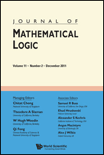
Journal of Mathematical Logic
Scope & Guideline
Innovating the Future of Mathematical Logic
Introduction
Aims and Scopes
- Foundational Logic and Set Theory:
The journal publishes works that investigate the axiomatic foundations of mathematics, including studies on Zermelo-Fraenkel set theory, the continuum hypothesis, and large cardinals. - Model Theory and Its Applications:
Research on model theory, including the properties of structures and their definability, is a significant focus. This includes studies on o-minimal structures, stability, and categoricity. - Computability and Complexity Theory:
The journal covers topics related to computability, algorithmic complexity, and reverse mathematics, exploring the relationships between logical frameworks and computational capabilities. - Descriptive Set Theory:
Papers often delve into descriptive set theory, focusing on the topological aspects of definable sets and their properties within Polish spaces. - Cardinal Characteristics and Forcing:
Research on forcing techniques and cardinal characteristics is prevalent, particularly in relation to the independence results and the structure of various cardinalities. - Combinatorial Set Theory:
The journal includes studies on combinatorial principles and their implications for set theory, including Ramsey theory and partition properties. - Algebraic Logic and Its Intersections:
Algebraic logic, including the study of algebraic structures related to logical systems, is also represented, particularly in the context of fields and groups.
Trending and Emerging
- Advanced Set Theory and Large Cardinals:
Recent publications show a marked increase in studies related to large cardinals and their implications for set theory. This trend underscores the growing interest in foundational issues and the strength of axioms in set theory. - Complexity and Reverse Mathematics:
There is a notable rise in the exploration of reverse mathematics and its connections to computational complexity, reflecting an increasing interest in understanding the foundations of mathematical truths through computational lenses. - Descriptive Complexity and Analytic Equivalence Relations:
Emerging themes in descriptive complexity and generalized analytic equivalence relations indicate a deeper exploration into the interplay between logic, topology, and computability. - Forcing and Independence Results:
The frequency of papers discussing forcing techniques and their applications to independence results has increased, suggesting an ongoing exploration of the boundaries of set theory and model theory. - Interdisciplinary Approaches to Logic:
An emerging trend is the integration of techniques from other mathematical disciplines, such as algebra and topology, into logical studies, reflecting a more holistic approach to mathematical inquiry.
Declining or Waning
- Classical Proof Theory:
Research focusing on classical proof theory, including sequent calculus and natural deduction systems, appears to be less frequent, possibly due to a shift towards more computational and model-theoretic approaches. - Elementary Substructures and Their Applications:
Papers examining elementary substructures and their applications in model theory seem to have declined, which may indicate a waning interest in this specific intersection of logic and algebra. - Nonstandard Analysis:
Topics related to nonstandard analysis, which previously had a robust presence, have become less common in recent publications, possibly overshadowed by newer methodologies in analysis and logic. - Finite Model Theory:
Research in finite model theory appears to have diminished, likely reflecting a broader trend towards infinite and more complex structures in logical research. - Philosophical Foundations of Logic:
While philosophical discussions around logic remain important, the journal has seen fewer papers explicitly addressing these topics, indicating a potential shift towards more technical and applied mathematical logic.
Similar Journals

TRANSACTIONS OF THE AMERICAN MATHEMATICAL SOCIETY
Championing Excellence in Mathematical ResearchTRANSACTIONS OF THE AMERICAN MATHEMATICAL SOCIETY, published by the American Mathematical Society, is a premier journal in the field of mathematics that has been contributing to the advancement of mathematical knowledge since 1900. With an ISSN of 0002-9947 and an E-ISSN of 1088-6850, this journal holds a prestigious position in the academic landscape, evidenced by its Q1 rankings in both Applied Mathematics and Miscellaneous Mathematics categories as of 2023. With a Scopus ranking of #97 in General Mathematics and a percentile standing of 75th, the journal is recognized for its rigorous peer-review process and the quality of the research it publishes. Though it does not currently offer open access options, it essentially serves as a vital resource for researchers, professionals, and students seeking critical insights and developments in mathematical theory and applications. The Transactions aim to publish high-quality research articles that foster the exchange and dissemination of ideas, supporting the growth of both theoretical and applied mathematics within the global scholarly community.
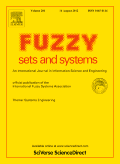
FUZZY SETS AND SYSTEMS
Innovating Interdisciplinary Approaches in Fuzzy SystemsFuzzy Sets and Systems, published by Elsevier, is a leading international journal that delves into the intricate field of fuzzy logic and its applications in various domains, including artificial intelligence and computational mathematics. With a significant impact within its categories—ranking Q2 in Artificial Intelligence and Q1 in Logic for 2023—this journal offers a robust platform for scholars to share cutting-edge research and developments. Focusing on the application of fuzzy set theory to enhance decision-making processes, modeling, and data analysis, it caters to a diverse audience of researchers, industry professionals, and advanced students. The journal's rigorous review process and prestigious ranking, evidenced by its impressive Scopus metrics—2nd in Mathematics & Logic and 120th in Computer Science—underscore its importance in the academic landscape. Contributors are encouraged to explore innovative methodologies, theoretical advancements, and interdisciplinary approaches. Fuzzy Sets and Systems continues to serve as a vital resource for advancing knowledge and fostering collaboration within the fuzzy logic community.

Commentationes Mathematicae Universitatis Carolinae
Fostering Mathematical Discourse and DiscoveryCommentationes Mathematicae Universitatis Carolinae, with ISSN 0010-2628 and E-ISSN 1213-7243, is a distinguished academic journal published by the Faculty of Mathematics and Physics at Charles University in the Czech Republic. Established in 1996, this journal serves as a platform for original research articles and contributions in the field of mathematics, catering to a diverse range of topics within the discipline. While classified in the Q4 quartile for 2023, it occupies an important niche within the mathematical community, particularly for emerging research and comprehensive studies. Although it is not open access, it offers authors an opportunity to disseminate their work through a reputable publisher, renowned for its scholarly contributions. With a focus on fostering academic discourse, Commentationes Mathematicae aims to engage researchers, professionals, and students alike, enriching the mathematical landscape and promoting collaboration within the field.
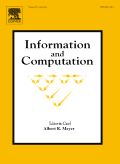
INFORMATION AND COMPUTATION
Bridging Theory and Practice in Information SystemsINFORMATION AND COMPUTATION is a peer-reviewed academic journal published by Academic Press Inc., Elsevier Science, dedicated to advancing the fields of computational theory and mathematics, computer science applications, and information systems. With an ISSN of 0890-5401 and an E-ISSN of 1090-2651, the journal provides a platform for innovative research that spans theoretical and applied perspectives. Acknowledged for its impact in the community, it holds a Q2 quartile ranking in several categories, including Computational Theory and Mathematics and Computer Science Applications, as of 2023. These rankings place it among the leading journals in its field, making it an essential resource for researchers, professionals, and students aiming to stay abreast of cutting-edge developments. While it does not currently offer Open Access options, the journal intends to foster scholarly communication and knowledge sharing from its inception in 1987 to its future issues expected through 2024. Located in the United States, at 525 B ST, STE 1900, SAN DIEGO, CA 92101-4495, INFORMATION AND COMPUTATION is committed to publishing high-quality research that influences the theoretical foundations and practical applications of its diverse disciplines.
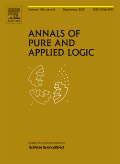
ANNALS OF PURE AND APPLIED LOGIC
Cultivating a Deeper Understanding of Logic's ImpactANNALS OF PURE AND APPLIED LOGIC is a premier academic journal published by Elsevier, specializing in the foundational aspects of logic since its inception in 1974. With a strong commitment to disseminating original research, the journal focuses on both pure and applied logic, making significant contributions to the fields of mathematics and computer science. The journal is recognized for its rigorous peer-review process and is currently ranked Q1 in Logic, reflecting its status among the top-tier publications in the discipline. Researchers will find valuable insights and advancements in logical theory and practice in its pages, while the journal's Scopus ranking further positions it strategically within the mathematical logic community. Although it is not an open-access publication, it offers convenient access options for institutions and subscribers, ensuring a wide reach for groundbreaking findings. The ANNALS OF PURE AND APPLIED LOGIC continues to be an essential resource for professionals, students, and academics alike, facilitating a deeper understanding of logical frameworks and their applications.
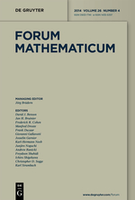
FORUM MATHEMATICUM
Exploring the Depths of Mathematical InnovationFORUM MATHEMATICUM, published by WALTER DE GRUYTER GMBH, is a distinguished academic journal based in Germany, known for its significant contributions to the field of mathematics. With an ISSN of 0933-7741 and an E-ISSN of 1435-5337, the journal features comprehensive studies ranging from applied mathematics to diverse mathematical disciplines. Having maintained a commendable presence since 1989, FORUM MATHEMATICUM has achieved notable classification rankings, including Q2 in Applied Mathematics and Q1 in miscellaneous Mathematics as of 2023. Additionally, it holds a Scopus rank within the top 60th percentile in General Mathematics, making it a prominent platform for researchers and professionals seeking rigorous analysis and innovative methodologies in mathematics. While the journal does not currently offer open access, its rich content is pivotal for advancing mathematical theory and applications, appealing to students and seasoned academics alike.

Computability-The Journal of the Association CiE
Unveiling New Dimensions in ComputabilityComputability - The Journal of the Association CiE, published by IOS PRESS, is a premier academic journal dedicated to advancing the field of computational theory and its applications. Established in 2012, this journal serves a diverse audience, including researchers, professionals, and students involved in the realms of Artificial Intelligence, Computational Theory and Mathematics, and Theoretical Computer Science. With robust categorization in Q2 and Q3 quartiles for various related fields, it provides a vital platform for innovative research and discussions that shape the landscape of computational technologies. Although it operates under a subscription model, the quality of published content ensures significant academic contributions and offers valuable insights relevant to contemporary scientific challenges. Researchers interested in the intersection of computation and its practical implications will find Computability an essential resource for exploring cutting-edge developments and fostering scholarly exchange.
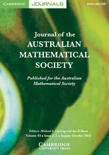
JOURNAL OF THE AUSTRALIAN MATHEMATICAL SOCIETY
Enhancing knowledge dissemination in the world of mathematics.JOURNAL OF THE AUSTRALIAN MATHEMATICAL SOCIETY, published by Cambridge University Press, is a prestigious journal dedicated to advancing research and scholarship in the field of mathematics. With a long-standing history since its inception in 1959, the journal has established itself as a vital resource for mathematicians, researchers, and students worldwide. Operating under an Open Access model, it ensures that high-quality research is accessible to all, enhancing the dissemination of knowledge and fostering collaboration in the mathematical community. The journal holds a commendable Q2 ranking in the 2023 Mathematics (miscellaneous) category and is ranked #145 in Scopus among general mathematics journals, placing it in the 63rd percentile, which reflects its significant influence and reputation in the discipline. The JOURNAL OF THE AUSTRALIAN MATHEMATICAL SOCIETY continues to provide a platform for innovative mathematical research and critical discourse within the field, making it an invaluable asset for professionals and aspiring mathematicians alike.

JOURNAL OF THE AMERICAN MATHEMATICAL SOCIETY
Pioneering Innovations in Mathematics and BeyondThe Journal of the American Mathematical Society (ISSN: 0894-0347; E-ISSN: 1088-6834), published by the American Mathematical Society, stands as a pillar in the fields of mathematics and applied mathematics. This prestigious journal, with a remarkable impact factor and ranking in the top tier (*Q1*) within both the Applied Mathematics and general Mathematics categories, is recognized for its contribution to advancing mathematical research and theory. With data reflecting it as the 8th ranked journal in General Mathematics (top 2%) and the 34th in Applied Mathematics (top 6%), the journal consistently showcases groundbreaking studies and innovative methods that greatly influence academia and industry alike. Though not an open-access journal, it offers a wealth of resources and intellectual discourse for researchers, professionals, and students alike. Specializing in comprehensive and theoretical aspects of mathematics, the Journal remains dedicated to publishing articles that promote understanding and propel the field forward, highlighting its significance as an essential tool for those engaged in mathematical research.
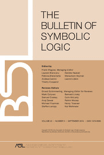
BULLETIN OF SYMBOLIC LOGIC
Illuminating the Pathways of Logical InquiryBULLETIN OF SYMBOLIC LOGIC, published by Cambridge University Press, is a distinguished academic journal that serves as an essential platform for the dissemination of research in the realms of logic and philosophy. Since its inception in 1995, this journal has progressed through its convergence years and remains committed to fostering intellectual discourse among scholars. With a 2023 ranking in the Q1 category of Philosophy and a Q3 classification in Logic, it continues to uphold its reputation as a significant contributor to the field. While operating under a traditional subscription model, the journal dedicates itself to publishing high-quality articles that explore foundational issues, advanced theories, and innovative insights in symbolic logic. Researchers, professionals, and students will find invaluable resources within its pages, particularly as it ranks favorably among peers, with noteworthy standings in Scopus rankings. For those seeking to deepen their understanding of logical frameworks and their philosophical implications, BULLETIN OF SYMBOLIC LOGIC is an indispensable resource.